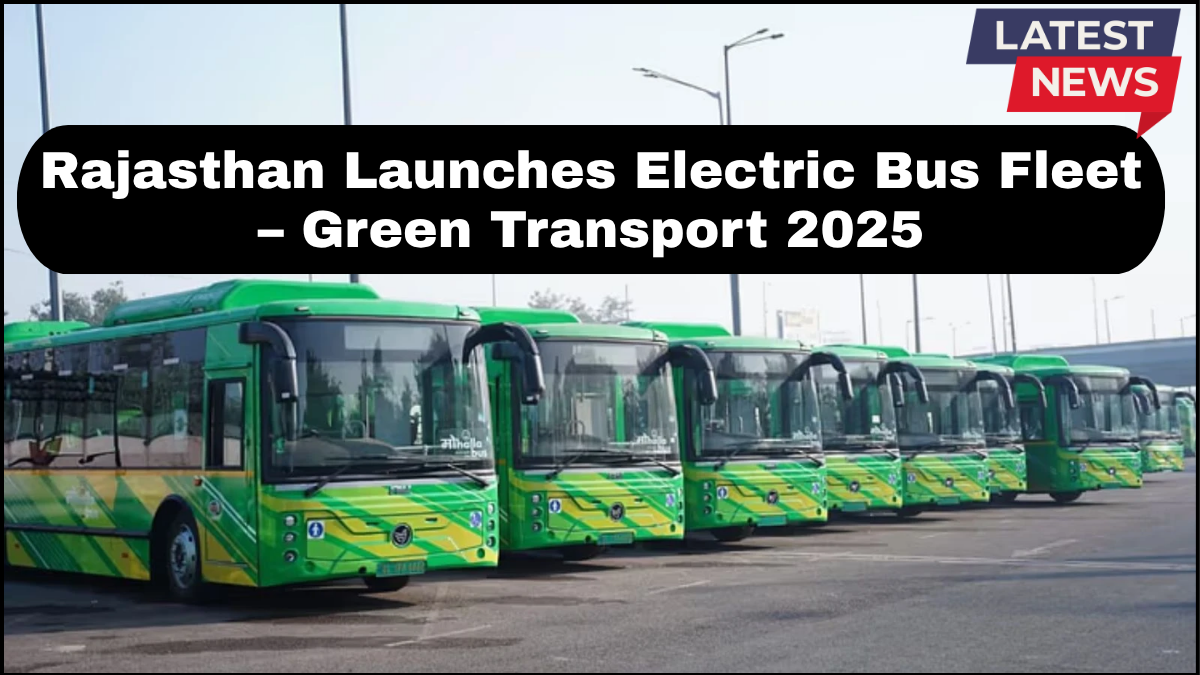Rajasthan has taken a bold step toward sustainable mobility with the launch of its electric bus fleet under the Green Transport 2025 initiative. This marks a pivotal moment in the state’s commitment to eco-friendly public transportation and positions Rajasthan as a forward-thinking leader in clean transit infrastructure. The Rajasthan Electric Bus Project is designed to modernize the state’s public transport system, reduce urban air pollution, and promote energy efficiency.

A Green Leap in Public Transport
The Rajasthan Electric Bus Project is a flagship component of the broader Green Transport 2025 vision. With the introduction of over 500 electric buses in major cities including Jaipur, Jodhpur, Udaipur, and Kota, the state aims to drastically reduce carbon emissions from its public transport network. These zero-emission buses are equipped with advanced battery systems, GPS tracking, and real-time passenger information systems, making them not only sustainable but also smarter and more commuter-friendly.
Each electric bus is expected to save approximately 60,000 liters of diesel and prevent nearly 160 tons of CO₂ emissions annually. Rajasthan’s push for electric mobility aligns with India’s national targets under the Faster Adoption and Manufacturing of Hybrid and Electric Vehicles (FAME) scheme.
Why Electric? Strategic Drivers Behind the Shift
The shift to electric buses isn’t just about clean air—it’s a strategic move. Diesel-powered buses, which currently dominate the state’s fleet, are expensive to maintain and contribute heavily to urban pollution. By transitioning to electric mobility, Rajasthan addresses several critical issues:
-
Air Quality Improvement: Urban areas like Jaipur and Jodhpur have witnessed a sharp increase in respiratory problems due to vehicular emissions. Electric buses, with zero tailpipe emissions, help combat this trend.
-
Energy Security: Relying on electricity—especially when generated from renewable sources—reduces dependence on imported fossil fuels.
-
Operational Efficiency: Electric buses have fewer moving parts than diesel vehicles, reducing maintenance costs and downtime.
The government has also committed to upgrading depot infrastructure with electric charging stations and battery-swapping facilities to ensure seamless operation.
Financing the Future: Investments and Partnerships
Implementing the Rajasthan Electric Bus Project required a multi-layered funding model involving public-private partnerships (PPP), central government subsidies under FAME-II, and state-level green bonds. The Rajasthan State Road Transport Corporation (RSRTC) has partnered with major e-mobility players and technology providers to ensure long-term viability and innovation in operations.
Private sector involvement has brought in advanced fleet management systems, route optimization tools, and AI-based maintenance forecasting—all of which enhance the efficiency and reliability of public transport services.
Enhancing Commuter Experience
Beyond environmental benefits, these electric buses are designed to upgrade the commuter experience:
-
Low-floor entry for accessibility
-
Real-time route updates via mobile apps
-
Cashless ticketing and smartcard integration
-
Air-conditioned interiors to beat the Rajasthan heat
The focus is clearly on making public transport not just green, but also convenient and appealing enough to draw more citizens out of private vehicles.
Rural Inclusion and Future Expansion
While the current phase focuses on urban hubs, the government has announced plans to extend electric bus services to Tier-2 cities and selected rural clusters by 2026. The emphasis on equitable access ensures that the benefits of clean mobility are shared across geographic and socio-economic divides.
In addition, Rajasthan plans to invest in electric minibuses for last-mile connectivity, addressing gaps in the current public transport ecosystem.
FAQs
Q1: What is the Rajasthan Electric Bus Project?
The Rajasthan Electric Bus Project is part of the Green Transport 2025 plan, aiming to modernize public transport by replacing diesel buses with a fleet of electric vehicles in urban and semi-urban areas.
Q2: How will electric buses benefit Rajasthan’s environment?
Electric buses produce zero emissions, reducing air pollution and greenhouse gas levels. They also minimize noise pollution and lower the carbon footprint of public transport.
Q3: Which cities are included in the first phase of this project?
Cities like Jaipur, Jodhpur, Udaipur, and Kota are part of the initial rollout, with future plans to expand to smaller cities and rural zones.
Q4: How is the project being funded?
Funding comes from a mix of state and central government schemes, including the FAME-II initiative, as well as investments from private companies under public-private partnerships.
Q5: What infrastructure changes are being made to support electric buses?
Charging stations, battery-swapping facilities, and modern depots are being constructed across key transit points to ensure efficient operations of the electric fleet.
click here to learn more